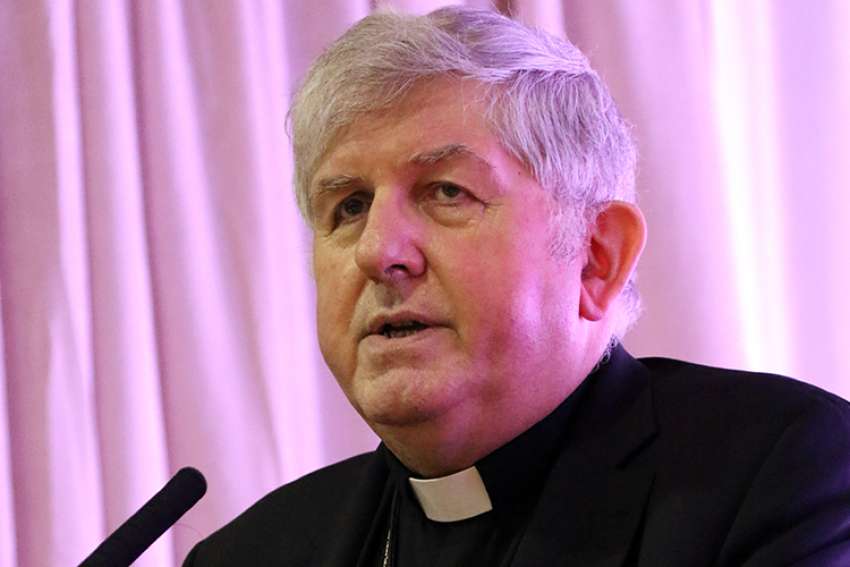This was one of the messages Cardinal Thomas Collins of Toronto shared with a New York audience June 16.
At a time when the Church is under attack by “grievously, ferociously secular people who are trying to squeeze faith out of everything,” those who take a deep dive into Scripture will find joy and some clarity, said the cardinal.
Collins gave the English keynote address at the ninth New York Catholic Bible Summit. Cardinal Juan Jose Omella of Barcelona, Spain, delivered the Spanish keynote address at the bilingual event.
More than 600 people attended the day-long program at the New York Catholic Center in Manhattan.
Collins said the Book of Psalms, with its copious examples of joy as a response to anxiety and fear, is a good resource for contemplative prayer. In the midst of the storms and strife of people’s contemporary lives, prayer puts events into a God-given perspective, he said.
Praying the psalms offers a window on reality because they describe “the good, the bad and the ugly,” he said. Because it is comprehensive and instructive, the Book of Psalms is “almost a fifth Gospel, the Gospel of David.”
Collins said the psalms are the “inspired hymns of the Old Testament.”
During an address he delivered largely without notes, the cardinal recited psalms from memory and used self-deprecating humour to illustrate the challenges of daily prayer.
“We need to train ourselves and ask the Lord for the disciples’ discipline to pay attention,” and hear the word of God in the gentle breeze, the cardinal said. “When we pray the Scriptures, we’re not supposed to squeeze them, but be attentive” and seek the path to God.
Collins said personal prayer is important but can become too self-absorbed and self-relevant. Formal prayer, such as the Mass, Scripture and the Hail Mary, can “stretch us and take us to” a new place in our relationship with God.
Distraction is a normal experience during prayer and can be kept to a minimum by “pulling your mind back to the text or repeating a phrase,” he said. “It’s good to pray in a quiet place, but sometimes the distraction is between our ears — and sometimes your distraction will be your prayer.”
Formal prayer, including the Liturgy of the Hours with specific readings for each day, “challenges me to think of a broader perspective than my own current one. I get out of my personal happiness and experience the suffering of others or I can leave my suffering and experience the greater joy of others.”
Collins said the Liturgy of the Hours has its roots in Judaism, was common in the early Christian church, came from parishes and was developed more fully in monasteries. The Liturgy of the Hours, also known as the Divine Office, includes five periods of prayer and reflection each day. While clergy and religious are obliged to pray the Liturgy of the Hours, laypeople are also encouraged to do so.
There is a time for both personal and formal prayers, Collins said. He recalled “Jesus ad-libbed His prayers in the Garden of Gethsemane, but quoted the psalms when He was on the cross.”
Collins said prayer should generally be “workmanlike and part of who we are, like the heart: it’s hidden, steady and does not have a creative beat.”
He said it is rare for people to have an intense high from their prayer unless they are mystics. In fact, some saints, including St. Teresa of Kolkata, only experienced a heady excitement from prayer a handful of times in their lives.
Although God sometimes gives us “cheap and temporary” joy of the “gooey” kind, sustainable joy and true faith are deeper, the cardinal said.
“There is evil all around us, some of it subtle, some not so subtle,” he said.
“We are facing an assault on faith and it’s all the more important we not react in a way that imitates the oppressors, but respond with the deep joy of the Gospel,” he said.
Psalms bring clarity to world, Cardinal Collins says
By Catholic News ServiceNEW YORK – Joy has to be rooted in the fullness of reality, the suffering of the Cross, the glory of the Resurrection and the providence of God, not in a gooey meringue of sweetness.
Please support The Catholic Register
Unlike many media companies, The Catholic Register has never charged readers for access to the news and information on our website. We want to keep our award-winning journalism as widely available as possible. But we need your help.
For more than 125 years, The Register has been a trusted source of faith-based journalism. By making even a small donation you help ensure our future as an important voice in the Catholic Church. If you support the mission of Catholic journalism, please donate today. Thank you.
DONATE

